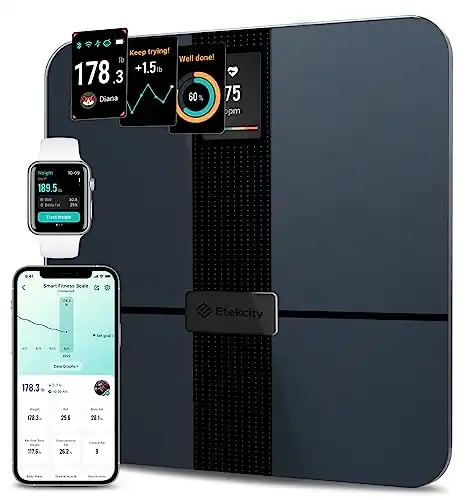
Tracking BMI Made Easy: The Best 5 Smart Scales
Tracking BMI has become more convenient and accurate than ever before thanks to the advancement of smart technology. This article is all about diving into the world of BMI (also known as Body Mass Index), smart scales, and uncovering the top options available that will not only help you easily stay on top of your BMI but also change the way you approach your health and wellness.
Tracking BMI is no longer a daunting task, thanks to the cutting-edge technology of smart scales. In the pursuit of better health and fitness, monitoring your Body Mass Index (BMI) has never been more convenient or precise.
Tracking your BMI is an easy way to gauge your health and is also considered a reliable indicator of body fat for most people. It can be utilized to screen for weight categories that may lead to health problems.
Table of Contents
What is BMI? It is basically a numerical representation of the relationship between our weight and height and provides us with a quick snapshot of our body composition.
Why is BMI so significant, and how can you effectively monitor it for better health using a Smart Scale?
Body Mass Index (BMI) is a number derived from your weight and height. It serves as a screening tool to categorize individuals into different weight categories, such as underweight, normal weight, overweight, or obese. While it may not provide a comprehensive assessment of one’s health, BMI offers a valuable starting point for understanding where you stand on the weight spectrum.
Standard BMI categories for adults:
- Underweight:
- BMI less than 18.5
- Normal Weight:
- BMI between 18.5 and 24.9
- Overweight:
- BMI between 25.0 and 29.9
- Obese:
- BMI of 30.0 or higher
Why is it Important to Track BMI?
Monitoring your BMI is essential because it can help you assess the health implications of your weight. Maintaining a healthy BMI is associated with a reduced risk of chronic diseases such as heart disease, diabetes, and certain types of cancer. Conversely, an elevated BMI can indicate the need for lifestyle changes to mitigate these risks. Tracking your BMI over time allows you to identify trends and keeps you accountable for your health and wellness. See more about the benefits of a healthy BMI below.
How Do Smart Scales Measure BMI?
Smart scales have revolutionized the way we track BMI and overall health. These modern marvels are not your ordinary bathroom scales.
Equipped with advanced technology, they provide a range of benefits that go beyond just measuring your weight.
Smart scales use bioelectrical impedance or other cutting-edge methods to measure various body composition metrics, such as body fat percentage, muscle mass, and of course, BMI.
This information can be synced with your smartphone or other devices, allowing for ongoing monitoring and analysis.

Factors to Consider When Choosing a Smart Scale
A. Accuracy and Precision of Measurements
- Measurement Technology: Different smart scales use various measurement technologies, such as bioelectrical impedance, load cell sensors, or air displacement. Research and understand which technology aligns best with your needs and preferences.
- Accuracy in BMI Calculation: Check the scale’s track record for accurately calculating BMI, as this is one of the primary metrics you’ll be monitoring. Read user reviews and expert assessments for insights into the scale’s precision.
B. Compatibility with Devices and Apps
- Syncing Capabilities: Ensure the smart scale you choose can sync data seamlessly with your smartphone, tablet, or fitness tracking apps. Compatibility with platforms like Apple Health, Google Fit, or specialized fitness apps can enhance your tracking experience.
- Wi-Fi or Bluetooth Connectivity: Consider whether you prefer a scale with Wi-Fi or Bluetooth connectivity. Wi-Fi scales allow for more convenient and automatic data uploads, while Bluetooth scales may require a more manual syncing process.
C. Design and Build Quality
- Aesthetic Appeal: Smart scales come in various designs, from sleek and minimalist to more traditional styles. Choose one that complements your bathroom or living space.
- Durability: Assess the build quality and materials used in the scale’s construction. A durable scale will withstand years of use.
D. Additional Features and Metrics
- Body Composition Analysis: Besides BMI, many smart scales provide insights into other body composition metrics like body fat percentage, muscle mass, and bone density. Determine which additional metrics are essential for your health goals.
- User Profiles: Look for scales that support multiple user profiles, as this is particularly useful for households with multiple individuals tracking their BMI and health progress.
- Integration with Wearables: If you use fitness wearables like smartwatches or fitness trackers, consider scales that can integrate data from these devices for a more comprehensive health overview.
- Advanced Features: Some smart scales offer advanced features like weather forecasts or heart rate monitoring. Decide if these extras are valuable to you.
E. Price Range and Budget Considerations
- Set a Budget: Determine how much you’re willing to invest in a smart scale. Prices can vary significantly, with basic models being more budget-friendly and advanced ones having higher price tags.
- Value for Money: Consider the balance between features and price. A more expensive smart scale may offer advanced metrics and features, but ensure that these align with your health goals.
Our Top Picks For Smart Scales That Track BMI
| Smart Scale | Accuracy and Precision | Compatibility with Devices and Apps | Design and Build Quality | Additional Features and Metrics | Price Range and Budget Considerations |
|---|---|---|---|---|---|
| Sharper Image Spatstudio | Known for accuracy | Limited app compatibility compared to other smart scales | Sleek and modern design | May have limited additional features | Mid-price range |
| EtekCity Smart Wi-Fi Scale | Reliable measurements | Syncs with VeSync app and others | Minimalist | Provides additional metrics like body fat percentage | Budget-friendly |
| Renpho Wi-Fi Smart Scale | Very precise readings compared to others | Compatible with a variety of health apps | Clean and simple design | Offers 13 essential body composition metrics | Great balance between features and price |
| Withings Body Comp Scale | Highly accurate | Integrates well with many apps | Aesthetic and sturdy | Measures body fat, muscle mass, and more | Mid-to-high price range |
| Inevifit Eros | Precise and durable | Connects to Inevifit app | Durable and long-lasting | Provides various metrics beyond BMI | Mid-range price |

By carefully evaluating these factors, you can narrow down your options and select a smart scale that not only tracks BMI effectively but also complements your lifestyle and health objectives.
Research consistently highlights the importance of maintaining a low or normal BMI (Body Mass Index) for overall health and reducing the risk of various chronic diseases. Here are some key findings and insights from scientific studies:
Benefits of a lower BMI
- Reduced Risk of Chronic Diseases:
- Maintaining a normal BMI is associated with a decreased risk of several chronic health conditions, including heart disease, type 2 diabetes, hypertension (high blood pressure), and certain types of cancer (e.g., breast, colon).
- Studies have shown that as BMI increases into the overweight and obese ranges, the risk of these conditions also increases significantly.
- Cardiovascular Health:
- Research indicates that a lower BMI is linked to better cardiovascular health. Individuals with a normal BMI tend to have lower levels of risk factors such as high cholesterol and triglycerides.
- Maintaining a healthy BMI can reduce the strain on the heart and lower the risk of heart disease.
- Improved Diabetes Management:
- For individuals with type 2 diabetes, achieving and maintaining a normal BMI can lead to better blood sugar control and a reduced need for medication.
- Weight loss and maintaining a healthy weight are often recommended as part of diabetes management.
- Joint Health:
- Excess weight, as indicated by a high BMI, places extra stress on the joints, particularly the knees and hips. Maintaining a normal BMI can help reduce the risk of joint problems and osteoarthritis.
- Quality of Life:
- Studies have shown that individuals with a normal BMI tend to report a higher quality of life, better physical function, and improved mental well-being compared to those with higher BMIs.
- Maintaining a healthy weight can enhance overall well-being and vitality.
- Longevity
- Research suggests that individuals with a normal BMI have a greater life expectancy compared to those with higher BMIs. Obesity, in particular, is associated with a higher risk of premature death.
It’s important to note that while a normal or low BMI is associated with health benefits, body mass index is a simplified measure and does not account for other factors that influence health, such as muscle mass, body composition, and genetics.
It’s important also to consider body mass index alongside other health indicators and always consult with a healthcare professional for personalized advice on maintaining a healthy weight and lifestyle. Additionally, the concept of “healthy weight” may vary among individuals, and health goals should be tailored to your unique circumstances and needs.
You may also Enjoy: The 10 Best Exercises To Improve Balance Using A Vibration Plate








